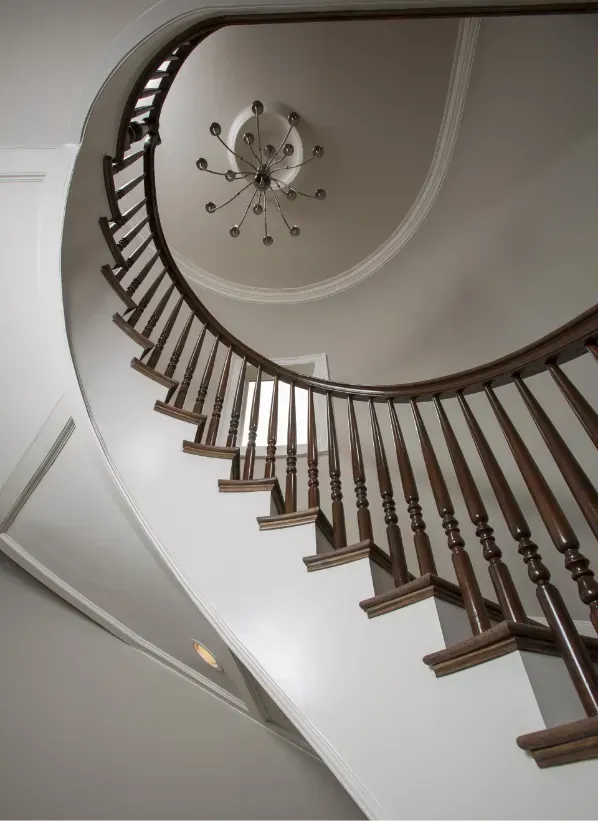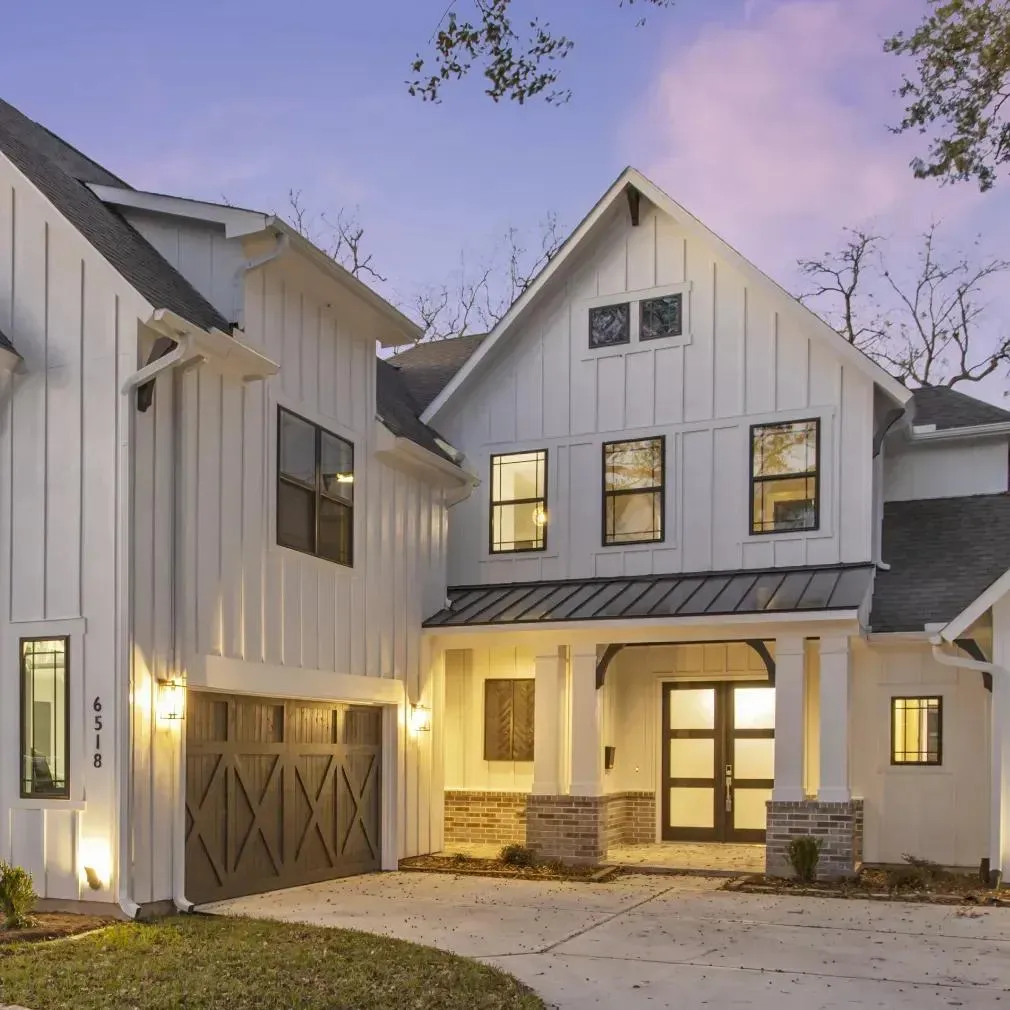Resources
Get Matched to the Right Builder
FIND THE PERFECT CUSTOM HOME BUILDER WITH OUR FREE ASSESSMENT
Tired of feeling overwhelmed? Look no further. We'll match you to the right builder in the Houston area and save you months of valuable time and money you'd spend trying to find one on your own. Click below to get started!

Download The Ultimate Custom Home Building Guide
A Step-by-step guide to building your custom dream home.

Download The Ultimate Custom Home Building Checklist
Finance

Finding Lot

Best Builder

Explore Our Gallery of Custom Homes
Browse our finished projects that display the craftsmanship of the builders we’ve matched with homeowners – turning dreams into reality.









BLOG

Licensed vs. Unlicensed Contractors: Which to Choose?
Choosing between licensed and unlicensed contractors can be challenging. Many people believe that hiring unlicensed contractors saves money, but this can lead to costly problems down the line. This article will explore what licensed contractors offer, the risks of unlicensed work, and how to identify trustworthy professionals. Readers will learn the importance of hiring licensed contractors, ensuring quality work, and protecting their investment. By understanding these key aspects, homeowners can make informed decisions that lead to successful projects and peace of mind.
Key Takeaways
Hiring licensed contractors ensures quality work and adherence to local building codes.
Unlicensed contractors may offer lower prices but carry significant risks for homeowners.
Licensed professionals provide insurance coverage, protecting homeowners from liability during projects.
Verifying a contractor's license helps ensure they are qualified and capable of meeting project standards.
Building relationships with licensed contractors can lead to smoother project execution and better outcomes.
Understanding Licensed Contractors

Licensed contractors are professionals who meet specific legal requirements to operate in their field. They offer benefits such as quality work, insurance coverage, and adherence to local laws. Understanding the types of licenses available, the process to obtain them, and how to verify a contractor's credentials is essential for making an informed choice when hiring a contractor.
Definition and Key Attributes of Licensed Contractors
Licensed contractors are trained professionals recognized by their state’s licensing board, indicating they have met specific standards in their field. They typically possess valuable experience and insurance and comply with local building codes and safety regulations. Hiring a licensed contractor assures clients that their project will be handled professionally, reducing the risk of issues arising from poor workmanship or legal complications.
Benefits of Hiring Licensed Contractors
Hiring licensed contractors provides homeowners peace of mind. These professionals have undergone thorough training and possess the necessary skills to complete projects efficiently and safely. Additionally, licensed contractors are typically insured, which protects clients from potential liability in case of accidents or damages that may occur during work:
Requirements for Obtaining a Contractor’s License
To obtain a contractor’s license, professionals must meet several key requirements. These can include completing a specific number of training or practical experience hours, passing relevant exams, and providing proof of insurance. By ensuring these standards, licensing boards help maintain quality and safety in construction projects, making it essential for homeowners to consider hiring licensed contractors for their remodeling or building needs.
Types of Licenses Contractors May Hold
Contractors may hold various types of licenses based on their area of expertise and the specific services they provide. For example, general contractors manage various projects, while specialized contractors may focus on fields like plumbing, electrical work, or roofing. Understanding these different licenses helps homeowners choose the right professional for their unique needs, ensuring that the selected contractor has the proper skills and knowledge to handle their project safely and effectively.
Verification Processes for Licensed Contractors
Verifying a contractor's license is a vital step for homeowners considering hiring a professional. This process typically involves checking the contractor's credentials through the state licensing board's website. Homeowners can also look for reviews and ask for references to ensure the contractor has a good track record in completing projects successfully. The verification helps protect clients from potential issues associated with unlicensed work:
Exploring Unlicensed Contractors

Unlicensed contractors are individuals who do not hold the necessary certifications to operate legally in the construction field. They often take on projects at a lower cost but carry significant risks for homeowners. The following sections will discuss the common reasons for hiring unlicensed contractors, the types of work they usually perform, and the potential legal implications involved.
Definition and Characteristics of Unlicensed Contractors
Unlicensed contractors are individuals who lack the necessary certifications and credentials to work legally in the construction industry. They often operate informally and may offer services at lower prices, making them attractive to homeowners on a budget. However, choosing an unlicensed contractor can lead to problems, including subpar workmanship, lack of insurance, and potential legal issues if project standards are unmet.
Risks Associated With Hiring Unlicensed Contractors
Hiring unlicensed contractors presents significant risks for homeowners. Without the proper certifications, these individuals may lack the necessary skills and knowledge, leading to poor workmanship that can compromise a project's safety and quality. Additionally, homeowners may face legal issues if an unlicensed contractor fails to meet building codes or standards, resulting in costly repairs and potential liability down the line.
Common Reasons Homeowners Choose Unlicensed Contractors
Homeowners often choose unlicensed contractors for various reasons, primarily due to the lower costs these individuals offer. Many see this as an opportunity to save money on projects, especially small repairs or renovations where they believe professional oversight may not be necessary. Additionally, some homeowners may not fully understand the risks involved, leading them to overlook the importance of hiring licensed professionals who comply with local regulations and standards.
Types of Work Typically Performed by Unlicensed Contractors
Unlicensed contractors often take on smaller jobs that may not seem as complex to homeowners, such as minor repairs, painting, landscaping, or basic home improvements. These types of work might appear straightforward, leading some to underestimate the importance of hiring a licensed professional. However, even simple tasks can lead to complications if they do not meet local codes or safety standards, potentially resulting in costly fixes or legal issues down the line.
Legal Implications of Hiring Unlicensed Contractors
Hiring unlicensed contractors can lead to several legal consequences for homeowners. If a project does not meet local building codes or standards, homeowners may face fines or be required to make costly corrections. Furthermore, without proper licenses, homeowners might find themselves with no legal recourse if issues arise, leaving them vulnerable to potential disputes and liability:
Potential fines for not meeting building regulations.
Costs associated with fixing substandard work.
Limited legal options in case of disputes.
Key Differences Between Licensed and Unlicensed Contractors

Homeowners must consider the key differences between licensed and unlicensed contractors before hiring. This section will compare the regulations governing contractors, financial protection and liability considerations, quality of work and professional standards, customer recourse and dispute resolution options, and the availability of warranties and guarantees. Understanding these factors helps ensure a safer and more satisfying home improvement experience.
Comparison of Regulations Governing Contractors
Licensed contractors operate under strict regulations set by their state’s licensing board, which include meeting specific training and testing requirements. This oversight ensures that they follow local building codes and safety standards, offering homeowners a level of protection and assurance. In contrast, unlicensed contractors often lack these regulatory constraints, which can lead to substandard work and potential safety hazards, leaving homeowners more susceptible to project risks and complications.
Financial Protection and Liability Considerations
Financial protection is a critical consideration when comparing licensed and unlicensed contractors. Licensed contractors are typically insured, offering homeowners a safeguard against accidents or damages that may occur during a project. In contrast, unlicensed contractors often lack this coverage, which can leave homeowners responsible for any costs arising from mishaps:
Licensed contractors provide insurance coverage for projects.
Unlicensed contractors may not have financial protection for homeowners.
Hiring licensed contractors can minimize liability risks.
Quality of Work and Professional Standards
Quality of work and professional standards significantly differ between licensed and unlicensed contractors. Licensed contractors are typically held to strict guidelines and are trained to meet high-quality standards. For example, they must follow local building codes and safely complete projects, reducing the risk of future issues. In contrast, unlicensed contractors may not have the same level of training or commitment to quality, leading to subpar results that can compromise the integrity of a project.
Customer Recourse and Dispute Resolution Options
When homeowners hire licensed contractors, they benefit from established customer recourse and dispute resolution options. Most licensed professionals must follow specific regulations, which often include guarantees for their work and procedures for addressing any problems that may arise. In contrast, unlicensed contractors may not provide the same protections, leaving homeowners with limited options if issues occur during a project:
Licensed contractors typically offer warranties for their work.
Homeowners can file complaints with licensing boards if problems arise.
Unlicensed contractors may not have formal processes for dispute resolution.
Availability of Warranties and Guarantees
Licensed contractors often provide warranties and guarantees for their work, giving homeowners assurance that the job meets established standards. This coverage means that if issues arise post-completion, homeowners can seek fixes at no additional cost. In contrast, unlicensed contractors typically do not offer such protections, leaving homeowners at risk if problems occur. Thus, it is crucial to weigh these factors when deciding who to hire.
How to Identify Licensed Contractors

Finding a licensed contractor involves several important steps. Homeowners should know where to access resources and databases to verify contractor licenses. They should also ask key questions about licenses and review past work to ensure quality. Lastly, utilizing online reviews and testimonials can help make a well-informed choice when comparing licensed and unlicensed contractors.
Steps to Find Licensed Contractors in Your Area
To find licensed contractors in an area, homeowners should start by using the online resources available through their state's licensing board. These official sites typically allow users to search for contractors by name or license number, providing essential information on their licensing status. Additionally, checking local directories and online reviews can help identify trusted licensed professionals who have successfully completed similar projects, ensuring a reliable choice for home improvements.
Resources and Databases for Verifying Contractor Licenses
Verifying a contractor's license can be straightforward when utilizing available resources and databases. Homeowners can visit their state’s licensing board website to search for a contractor’s licensing status by name or license number. This process helps ensure that only qualified professionals are considered for home projects, minimizing the risk of issues associated with hiring unlicensed contractors.
Questions to Ask Potential Contractors Regarding Their Licenses
When looking for licensed contractors, homeowners should ask specific questions to confirm their credentials. It is important to inquire about their license type and whether it is current. Additionally, asking for proof of insurance can provide further assurance that the contractor can handle potential issues during the project. Checking these details helps ensure homeowners hire qualified professionals who comply with local regulations.
Importance of Checking Credentials and Past Work
Checking a contractor's credentials and past work is essential for homeowners looking to ensure quality and reliability. Licensed contractors often present a portfolio highlighting their previous projects, reflecting their experience and attention to detail. By reviewing this information, homeowners can gain confidence in their choice and avoid common pitfalls of hiring unlicensed contractors, such as subpar craftsmanship and potential legal issues.
Utilizing Online Reviews and Testimonials
Utilizing online reviews and testimonials is a valuable step for homeowners when selecting licensed contractors. These resources offer insights into the contractor's past performance, helping potential clients gauge the quality of work and customer satisfaction. By reading what others have experienced, homeowners can make a more informed decision on the right professional for their construction needs:
Importance of Hiring Licensed Contractors

Hiring licensed contractors offers several advantages that can impact both immediate and long-term project outcomes. Understanding the long-term cost implications, insurance and bonding, and the potential effects on project timelines and quality provides homeowners with vital insights. Additionally, legal protections available when hiring licensed professionals and the opportunity to build relationships with reputable contractors further emphasize the importance of selecting licensed over unlicensed contractors.
Long-Term Cost Implications of Using Licensed Versus Unlicensed Contractors
Choosing licensed contractors over unlicensed ones can have significant long-term cost implications for homeowners. While unlicensed contractors may offer lower upfront costs, they often lack the necessary skills and experience, potentially leading to costly mistakes that require expensive repairs down the line. For example, if an unlicensed contractor fails to meet building codes, homeowners may face fines or additional costs to correct the issues, making the initial savings not worth the risk. Therefore, investing in licensed contractors ensures quality work and saves homeowners from future financial burdens associated with inadequate construction practices.
Understanding Insurance and Bonding for Licensed Contractors
Understanding insurance and bonding for licensed contractors is crucial for homeowners looking to protect their investments. Licensed contractors usually carry liability insurance, which safeguards clients from financial loss due to accidents or damages during the project. Bonding adds another layer of protection, ensuring that the contractor will complete the work as promised; if they fail to do so, clients can seek financial compensation. This coverage helps homeowners avoid unexpected expenses and provides peace of mind, making licensed contractors a reliable choice for residential projects.
Impact on Project Timelines and Quality of Results
Hiring licensed contractors can significantly improve project timelines and the quality of results. With their training and experience, licensed professionals are more likely to complete projects efficiently and to a high standard. In contrast, unlicensed contractors may lack the necessary skills or knowledge, often leading to delays and subpar work that may require costly fixes in the future:
Licensed contractors adhere to project timelines, ensuring work is completed as promised.
Quality craftsmanship from licensed professionals minimizes the need for corrections and rework.
Homeowners can trust licensed contractors to follow local building codes, promoting safety and compliance.
Legal Protections Available When Hiring Licensed Professionals
Hiring licensed contractors provides significant legal protections for homeowners. These professionals are accountable to state licensing boards, which enforce regulations and standards. If issues arise, homeowners can often pursue complaints or seek compensation through these regulatory bodies, ensuring better outcomes compared to working with unlicensed contractors who lack such oversight:
Licensed contractors adhere to established regulations.
Clients can file complaints with licensing boards if problems occur.
Legal recourse is often available for financial compensation.
Building Relationships With Reputable Contractors
Building relationships with reputable licensed contractors can provide significant benefits for homeowners. When clients hire licensed professionals, they often find trustworthy partners who prioritize quality and open communication. This bond not only results in smoother project execution but also encourages contractors to go the extra mile, ensuring that the work aligns with client expectations and meets local regulations.
Conclusion on Choosing Between Licensed and Unlicensed Contractors

When deciding between licensed and unlicensed contractors, homeowners must carefully consider key factors in their hiring decisions. Weighing the risks and benefits is crucial for ensuring quality and safety in home projects. Homeowners should prioritize licensed professionals to secure their investments and protect their interests, especially for future maintenance and renovation needs.
Recap of Key Factors to Consider in Hiring Decisions
When choosing between licensed and unlicensed contractors, homeowners should carefully assess several key factors. These include the level of training, insurance coverage, and ability to meet local regulations. By prioritizing licensed contractors, homeowners can benefit from quality work, legal protections, and peace of mind, helping to ensure a successful and safe project.
Encouragement to Weigh Risks and Benefits
Homeowners should carefully weigh the risks and benefits of hiring licensed versus unlicensed contractors. While unlicensed contractors might offer lower prices, the long-term consequences of poor workmanship can lead to higher costs and legal issues. Opting for a licensed contractor typically ensures quality work, compliance with local regulations, and protection through insurance, making it a safer choice for any construction or renovation project.
Final Thoughts on Ensuring Quality and Safety in Home Projects
Ensuring quality and safety in home projects hinges on hiring either licensed or unlicensed contractors. Homeowners must recognize that while unlicensed workers may offer lower costs, the risks often outweigh the initial savings. By opting for licensed professionals, clients can expect adherence to local building codes, higher quality workmanship, and insurance coverage protection, ultimately safeguarding their investment and peace of mind throughout the construction process.
Call to Action for Homeowners to Prioritize Licensed Professionals
Homeowners are encouraged to prioritize licensed contractors when undertaking any construction or renovation project. Licensed professionals bring valuable skills, experience, and adherence to local building codes, ensuring high-quality work that meets safety standards. By choosing licensed contractors, homeowners can protect their investments and enjoy peace of mind knowing that they have legal recourse if issues arise during or after the project.
Future Considerations for Home Maintenance and Renovation Projects
When considering future home maintenance and renovation projects, homeowners should prioritize hiring licensed contractors to ensure ongoing safety and compliance with local building codes. Licensed professionals bring the necessary expertise and the promise of insurance protection, which can save homeowners from costly repairs and legal issues down the line. Investing in quality workmanship from licensed contractors ultimately leads to better long-term results, making home maintenance and renovations smoother and less stressful.
Conclusion
Choosing between licensed and unlicensed contractors significantly impacts the quality and safety of home projects. Licensed professionals offer peace of mind through their training, insurance, and adherence to local regulations, ultimately protecting homeowners from potential risks and costly mistakes. In contrast, unlicensed contractors may provide lower upfront costs but often lead to subpar workmanship and legal complications down the line. Prioritizing licensed contractors ensures quality work and long-term value, making it essential for homeowners to make informed decisions about their renovations and maintenance.
Contact Us Today To Learn More



